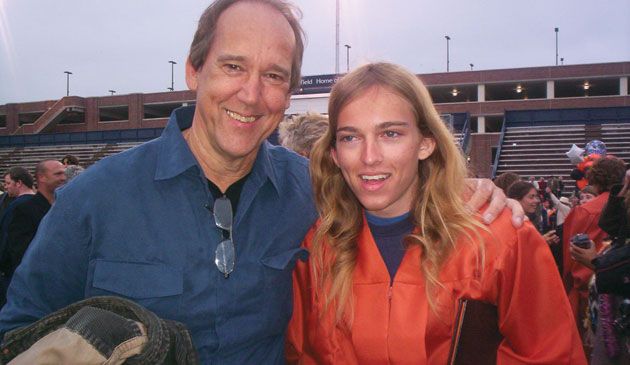
Father and Son at graduation in happier days. From Mother Jones Magazine, courtesy of the family.
I generally post a blog from my files each Friday but today I am making an exception to share two stories and a website with you that are well worth your time.
Schzophrenic. Killer. My Cousin by Mac McClelland is a riveting story published by Mother Jones Magazine that combines the author’s investigation into a murder inside her family with a study of how we’ve gutted our mental health care system. The sub-title of the story reads:
It’s insanity to kill your father with a kitchen knife. It’s also insanity to close hospitals, fire therapists, and leave families to face mental illness on their own.
Collectively, states have cut $4.35 billion in public mental health care spending since 2009, the author notes. Meanwhile, between 1998 and 2006, the number of mentally ill people incarcerated in federal, state and local prisons and jails has more than quadrupled.
The Problem With How We Treat Bipolar Disorder by Linda Logan published in the New York Times Magazine presents an interesting viewpoint about the loss of self and identity when you are diagnosed with a mental disorder.
The last time I saw my old self, I was 27 years old and living in Boston…The moment the psych-unit doors locked behind me, I was stripped of my identity as wife, mother, teacher and writer and transformed into patient, room number and diagnosis. I couldn’t open a refrigerator without permission. If I were on suicide watch, I had to ask before going to the bathroom. I was told when to sleep and when to wake, when to eat and when to go to group. My routine, which at home had cleaved so closely to my children’s, now revolved around the clattering sounds of the food trays being brought three times each day from the service elevators into our unit. With my husband and children nearly 1,000 miles away, I was severed from my fixed stars. I missed my children’s smells, the way they used to wrap their bodies around my legs when I was on the phone. I brought my son’s comforter to the hospital for my bed. I remembered him with one leg thrown across the covers, a small foot peeking out from his pajamas.
In addition to these two articles, you should take time to visit the Sak’s Institute for Mental Health Law, Policy and Ethics website. Elyn, of course, is the author of The Center Cannot Hold, a brilliant book about her recovery from schizophrenia. Last year, Elyn invited me to deliver a speech at the University of California Gould School of Law where she teaches. Elyn recently held a two day symposium that focused on the criminalization of mental illness. The speakers included my good friend, Judge Steven Leifman from Miami Dade County; Richard Bonnie, who spearheaded the reworking of Virginia’s mental health system; Henry J. Steadman, a top researcher, and top California mental health and law enforcement officials. You can watch videos on Elyn’s website of each of their presentations and read their powerpoints that document how our jails and prisons are continuing to serve as our new asylums.
It’s important to keep the need for mental health reform in the public spotlight. These articles and Elyn’s symposium do that.
BRAVO!




Linda Logan is very lucky to have received the excellent treatment she did, in 1989. Almost 25 years later, it is difficult to impossible to get Medicaid health insurance to pay for MRI’s, sleep studies, and the intensive doctor-patient therapy. The ‘self’ is always affected and continues both to hold, and morph throughout bouts w/ mental illness and recovery. Unfortunately, for the poor and under-insured, ‘real help’ to become the best that one can be, is not there. Just like junk food is acceptable for people on food stamps, minimal mental health treatment is acceptable for the poor. Somehow, providing jobs for the prison industry, and shallow badly run outpatient case management system, is more important in the good ole USA. Somewhere around 80-90 percent of the millions of Amercans w/ mental illnesses, upon receiving excellent, timely,mental health intervention, would become healthy, productive citizens. Mental illness is more ‘curable’ than cancer, There is big money in keeping mentally ill people untreated. This factual blemish on our combined social, economic, medical, judicial, and governmental systems, needs to be exposed and wiped out. The obscene practice of profiting off the sick, while keeping them in a needless state of suffering should outrage all.
Not only do we need to keep the need for mental health care reform in the public spotlight, we need to insist that every American has the right to the state of the art medical treatments that are now available to render virtually all mental illnesses manageable. The public needs to demand accountability from drug companies, medical professions, all related institutions including the federal gov’t , for witholding known effective treatments, so that they can amass untold billions in profits, by continueing the circle of ineffective drugs, substandard therapy, custodial care, cruel, inhumane prison warehousing, all in the name of ‘keeping the public safe’ and ‘keeping the mentally ill just sick enough to make money off them’..
Moral righteousness – it never hurt anyone.
May we be brave enough to hold ourselves to it, and
raise it as a beacon toward the ever-growing moral decay
throughout our Ameican society.